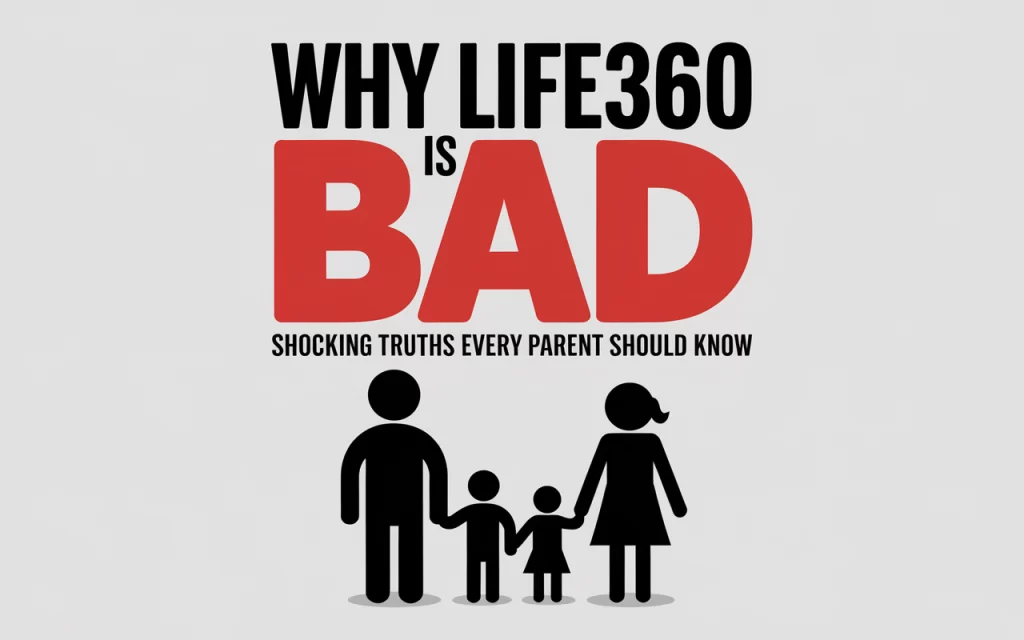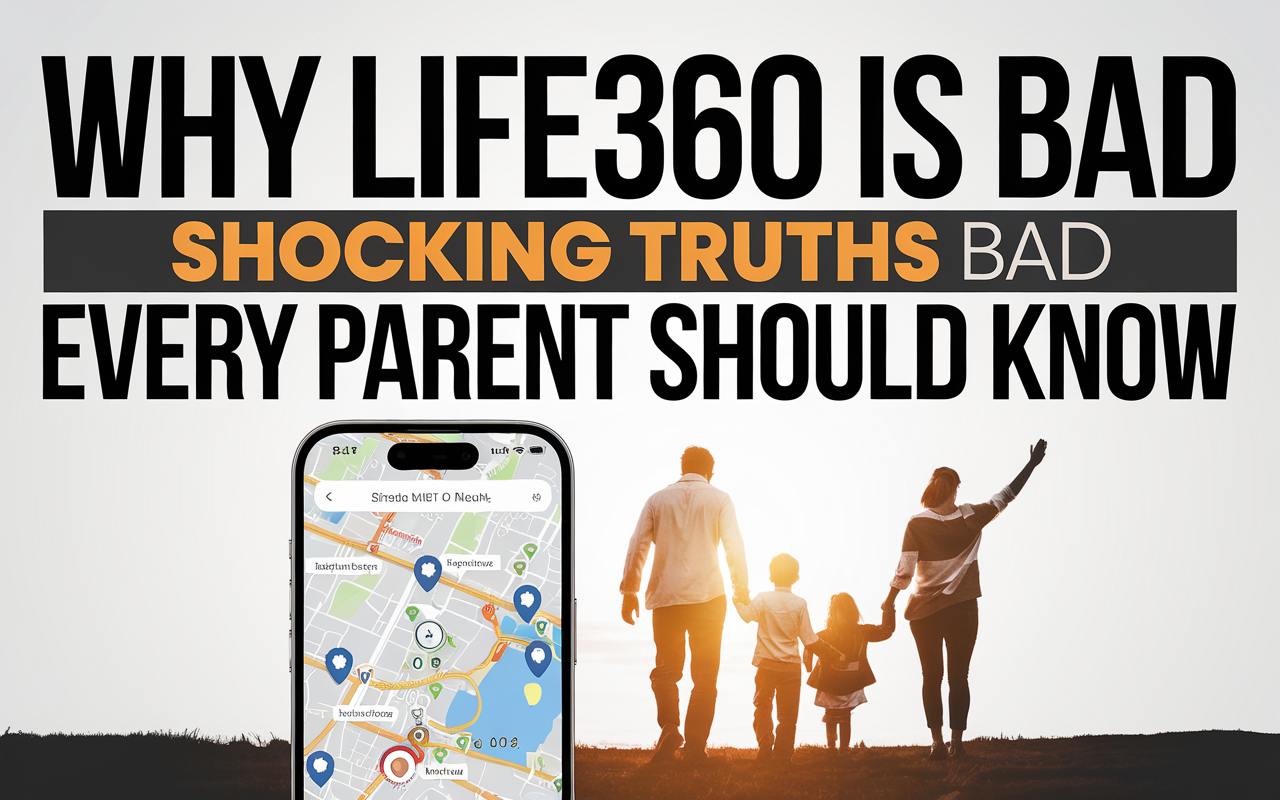When it comes to keeping our loved ones safe, especially our children, parents often turn to technology for reassurance. Why Life360 Is Bad is one such app that promises to keep families connected and secure by tracking their every move.
On the surface, it sounds like a gift to worried parents, offering peace of mind and a sense of control over their children’s whereabouts. However, as many users have discovered, there are deeper, more troubling aspects of Life360 that make it far from the perfect solution it claims to be.
In this article, we’ll explore the unsettling realities behind Life360, revealing why it might do more harm than good for families seeking to protect their privacy and maintain healthy relationships.
Stalking Issues

One of the most disturbing aspects of Life360 is its potential for stalking. Imagine a scenario where a boyfriend secretly installs the app on his partner’s phone and disables notifications, allowing him to track her live location without her knowledge.
While Life360 is marketed as a tool for safety and security, in the wrong hands, it can easily be misused. This misuse of technology transforms a tool meant for protection into one that invades privacy, creating a dangerous situation where someone’s movements can be monitored without their consent.
The ability to track a person’s location without them being aware raises serious concerns about privacy and the ethical implications of such monitoring. Parents need to be aware that what is intended to keep their family safe can just as easily be used to infringe on someone’s independence and sense of security.
Trust Issues
Why Life360 Is Bad can also lead to significant trust issues within families and among friends. The constant monitoring of a person’s whereabouts can foster a deep sense of mistrust.
For instance, when parents or a partner feel the need to continuously check on their loved ones, it can create unpleasant behavior and strain relationships. Instead of building a sense of safety, this excessive monitoring often drives a wedge between people, leading to stress, anxiety, and, ultimately, a lack of privacy.
This kind of negative direction is counterproductive, as it erodes the foundation of mutual trust that is crucial for healthy relationships. In the end, the very tool designed to bring families closer can end up pushing them apart.
False Sense of Security
Relying heavily on Why Life360 Is Bad can create a false sense of security that might give parents and loved ones the illusion that they are keeping their families safe. While the app provides real-time updates on the location of friends and family, this constant tracking is not a substitute for genuine safety measures.
Simply knowing someone’s whereabouts doesn’t address the need for emergency contacts or the importance of teaching safety rules. In reality, depending solely on Life360 can be a double-edged sword—it may make you feel in control, but it doesn’t guarantee real protection in critical moments.
This reliance can lead to complacency, where essential conversations about safety are overlooked, and the presence of the app is mistakenly seen as sufficient to ensure everyone’s well-being.
Accuracy Concerns

Another critical issue with Life360 is the potential for accuracy concerns. Location-tracking apps like this can be easily manipulated using third-party applications such as Fake GPS Location, which allow users to deceive the app about their true location.
For instance, a child could use such an app to make it appear as though they are attending a tuition session when they are actually playing in the park. This manipulation undermines the very purpose of Life360, rendering it unreliable in situations where accurate information is crucial.
Parents might feel reassured by the app’s updates, but in reality, they could be misled by false data, creating a dangerous gap between perceived and actual safety.
Battery Drain and Data Usage
Another significant drawback of using Life360 is its impact on battery drain and data usage. Due to its constant location tracking and reliance on maps, the app can consume a large portion of your phone’s battery.
This is particularly concerning for those who are not very tech-savvy or who rely on low cellular data plans, as the continuous tracking can quickly drain both battery and data. On some devices, like the iPhone, it’s been reported that the Life360 app can use up to 30% of the battery, leaving users with little power for other essential tasks.
This issue not only affects the performance of the device but also adds an unnecessary burden, especially for users who need their phones to last throughout the day.
Also Read: Why Is Sleeping Beuaty Cursed? Explore the Forgotten Legend
Subscription Costs
While Life360 offers a free plan that includes many of its core features, those looking for enhanced safety options will find themselves needing to subscribe to a membership plan. This premium plan starts at $99.99 per year and includes additional services such as crime reports, free towing, 7-30 days location history, ID theft protection, and unlimited place alerts.
While this price might not be a major concern for users in developed countries like the US, UK, and Canada, it can be significantly more burdensome for users in developing countries such as India, Vietnam, the Philippines, and Thailand. The cost may deter some families from accessing the full range of safety features, raising questions about the app’s accessibility and value for users in different economic contexts.
Privacy Settings You Need to Enable on Life360

To protect your privacy while using Life360, it’s crucial to adjust the privacy settings to limit how much of your personal information is shared with third parties. Life360 has been known to collect and share data with third-party services for commercial use, which can lead to concerns about your data being misused or used for targeted ads.
To gain some peace of mind, you can enable settings that prevent the app from selling or sharing your information. For instance, you can instruct Life360 not to sell your data by accessing the Privacy & Security section in the app’s settings. By taking these steps, you can enhance your privacy and reduce the risk of your data being exploited.
What about safety?
When it comes to safety, Life360 can be a double-edged sword. While it offers a sense of security by allowing you to know your loved ones’ whereabouts, this illusion of control can be misleading.
Many parents, influenced by the fears from their youth—like the images of missing children on milk cartons and warnings about stranger danger—cling to apps like Life360 to keep their children safe. However, it’s important to remember that the National Center for Missing & Exploited Children reports that most missing children cases involve runaways, not abductions by strangers.
Additionally, teens might find ways to circumvent the app’s tracking features, such as leaving their phones behind or using apps that can freeze their location, which can render Life360 ineffective. Therefore, while the app provides a layer of safety, relying on it entirely can be misleading, as it doesn’t address the root causes of safety concerns.
The Ground Rules
As a parent, it’s essential to strike a balance between monitoring and respecting your child’s independence. After deciding that Life360 wasn’t the right fit for our family, we established some ground rules to ensure safety while giving our son the space to grow.
First, he must always call or text us to let us know where he’s going and inform us if he changes locations. His phone should remain charged at all times, and he needs to reply promptly when we reach out. We’ve agreed that we’ll only use Find My iPhone in actual emergencies when we cannot locate him.
These rules help maintain his independence while also ensuring his safety and privacy. It’s our way of showing that we trust him while still keeping open communication during his teenage years.
Closing Thoughts
While Life360 may seem like a convenient tool for keeping your family safe, it’s important to consider the potential downsides. From privacy concerns and battery drain to the risk of fostering trust issues and creating a false sense of security, the app may do more harm than good.
As parents, it’s crucial to find a balance between staying informed about our children’s whereabouts and allowing them the freedom to grow and learn. By establishing clear ground rules and maintaining open communication, you can ensure your child’s safety without relying too heavily on technology. In the end, trust, understanding, and a strong relationship will always be the most reliable safeguards for your family.
FAQs:
What are the privacy concerns with Life360?
Life360 collects detailed location data, which could be shared with third parties. This raises significant privacy issues for users, especially teens.
Can Life360 negatively affect family trust?
Yes, constant tracking can create tension and erode trust within families, as it may lead to feelings of invasion of privacy.
Is Life360 data secure from hackers?
Life360’s large data collection makes it a potential target for hackers, putting personal information at risk if security measures fail.




